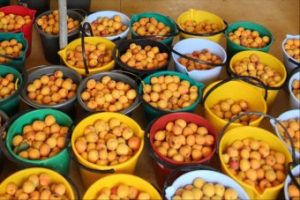Giselle Wakatama of ABC News Australia reports the sale of apricot kernels as food was banned in December by Food Standards Australia New Zealand (FSANZ), killing the $600,000 a year industry.
 Before the ban, FSANZ said about 20,000 kilograms of apricot kernels were sold for human consumption in Australia each year.
Before the ban, FSANZ said about 20,000 kilograms of apricot kernels were sold for human consumption in Australia each year.
Since the ban, inspectors from the New South Wales Food Safety Authority have been keeping an eye out for illegal sales.
The authority has revealed a Singleton-based online company, Fourbody, has been fined nearly $900 for selling the kernels illegally.
The company’s online website said it sourced the kernels from Turkey.
Fourbody did not respond to the ABC’s requests for comment.
Another supplier, Heal Yourself Australia, operating from Greenacre in Sydney, was fined the same amount for selling the kernels illegally earlier this year.
It too was found to have sold food that did not comply with the requirements of the Food Standards Code.
Consumer group Choice has previously said the apricot kernels, which are found inside the fruit’s stone and look similar to almonds, can be toxic.
Choice reported the apricot kernels had been sold as a miracle cancer cure since the 1950s, under the misguided premise that the cyanide targeted only cancerous cells, leaving healthy cells alone.



.jpg) Dr Young said.
Dr Young said.